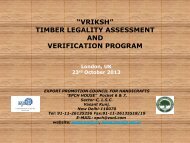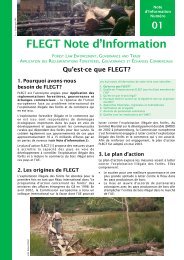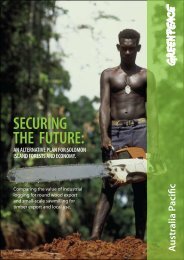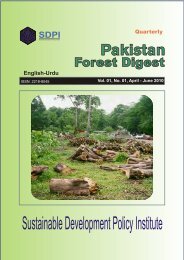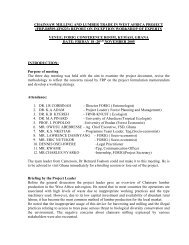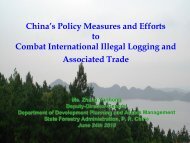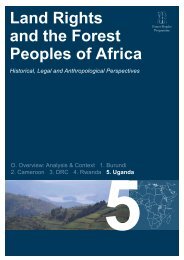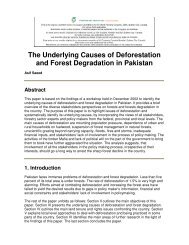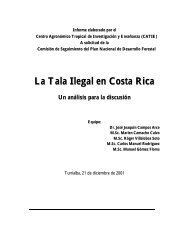CHAINSAW MILLING IN GHANA: CONTExT, DRIVERS ... - Fornis.net
CHAINSAW MILLING IN GHANA: CONTExT, DRIVERS ... - Fornis.net
CHAINSAW MILLING IN GHANA: CONTExT, DRIVERS ... - Fornis.net
- No tags were found...
Create successful ePaper yourself
Turn your PDF publications into a flip-book with our unique Google optimized e-Paper software.
Chapter 6. Conclusions and policy recommendations6.2.3 AccessTenure reforms that recognise some ownership or management rights on the partof communities, especially outside forest reserves, are an important consideration. Inpractice, farmers already decide the fate of trees on their land. The current regime ofbenefit-sharing — which alienates communities — needs major restructuring in orderto gain community support in the management of forest resources.6.2.4 Policy reform: lifting the ban?Chainsaw operations need to be regulated, either through effective enforcement ofthe ban or by being integrated into mainstream forest management and operations.Declaring that chainsaw milling is illegal without addressing the timber markets thatsell its “illegal” products is not realistic or effective.The legal framework criminalises the use of chainsaw milling and trading for commercialpurposes, although its enforcement has been fraught with difficulties andinconsistencies. The law does not criminalise CSM for household use, but the FSD’sManual of Operations fails to provide straightforward procedures for domestic usepermits. This makes it difficult to use a chainsaw to mill timber for local consumption.Studies of social, economic and environmental impacts show that most of thenegative impacts of chainsaw milling are the result of its being banned and of theattendant problems of ineffective monitoring, rather than the practice itself. If thefundamental reason for the chainsaw ban was its adverse environmental impacts, theempirical observations in the study do not support this claim.In spite of the ban on chainsaw milling in Ghana, the practice is highly acceptedamong the general public. It is also supported by some stakeholders, including morethan half of FSD District Managers. The timber trade associations, especially theGhana Timber Millers’ Organization, oppose it, however.Since chainsaw milling has broad social acceptance and significant economicimpacts and it supplies a critical domestic market, maintaining a ban without effectiveenforcement capability will likely only enforce connivance and illegality.Enforcing the ban will be challenging unless three critical conditions are simultaneouslymet:• the timber industry is prepared to supply wood to the domestic market;• FSD procedures are streamlined to allow for the processing of timber fordomestic use; and• resource governance is significantly improved (particularly in terms of corruptionwithin the FSD and law enforcement agencies) and genuine political willfor addressing chainsaw milling is secured.Since it is unlikely that these conditions can be met within the near future, and sincechainsaw milling is increasing, some immediate interventions should be instituted.49



